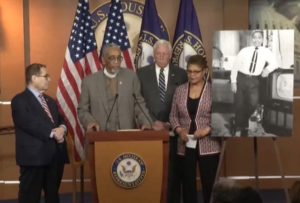Jabari Asim: The Rise of the Black Republican
Maryland's African-American voters had to make a difficult decision on Nov. 7 -- whether to send Michael Steele, a black Republican, to the Senate, or instead back a party some feel takes them for granted.WASHINGTON — While watching election-night coverage of the Democrats reclaiming Congress, I recalled a conversation I had with Michael Dawson, a professor at the University of Chicago who studies black voting patterns. He told me that African-Americans often face “a choice between voting the second party and not voting at all.”
At first glance, conditions didn’t seem quite that stark for blacks in Maryland, where I vote. After all, African-Americans were represented on both sides of the ballot. Anthony Brown, a Democrat, sought and ultimately won the race for lieutenant governor. His predecessor in the post is Michael S. Steele, a black Republican whose vigorous campaign for the U.S. Senate ended in defeat.
What’s more, black Marylanders weren’t forced to choose between Steele and an indifferent Democrat. Ben Cardin, who defeated Steele, has an admirable record on issues of concern to African-Americans. Adding to Cardin’s advantage was widespread dissatisfaction with President Bush’s handling of the war in Iraq — a factor among voters of all races. Steele nonetheless managed to make a big splash and perhaps put himself in position for a larger role in his party.
Despite Bush’s plummeting approval ratings and Maryland’s heavily Democratic population, Steele and his camp suspected there were flaws to be uncovered and exploited. Steele is a resident of Prince George’s County, a mostly middle-class community known for its high-earning blacks who seldom have been able to parlay their pocketbooks into genuine economic and political clout. One-third of Maryland’s black population lives in Prince George’s, and the state Democratic leadership has come to rely on its loyalty. But black leaders in Prince George’s have often spoken out against Democrats taking them for granted and ignoring their concerns when doling out largesse at the state capitol in Annapolis.
Banking on his prominence as the only black statewide elected official in Maryland, Steele tried to lure away the grumblers with commercials that downplayed his party affiliation (quite a posture for the former head of the Maryland Republican organization) and emphasized his affability. Occasionally he went too far: On Election Day, his campaign bused in poor Philadelphians to distribute “Democratic Sample Ballots” that misleadingly suggested that notable black Democrats were backing Steele’s run.
He did, however, manage to snare the support of some of Prince George’s County’s prominent black Democrats. Although their embrace of Steele proved to have little impact on the election, it did expose that same dilemma that Dawson mentioned during our chat. One of Steele’s endorsers, County Council member Samuel H. Dean, told The Washington Post, “This was less about Michael Steele and more about the Democratic Party taking us for granted.”
Even Rushern L. Baker, a leading black Democrat who did not endorse Steele, found complaints such as Dean’s credible. “Whether African-American, Latino or woman, the diversity is just not there. The party is going to have to make changes to go forward.”
Deeper examination makes it easy to see his point. Brown, the one black Democratic candidate for statewide office, will be occupying a post that’s largely ceremonial.
The glacial pace of Democratic progress didn’t hurt the party at all in Prince George’s County, where it grabbed at least 75 percent of the vote. From one perspective, it looks as if the Democrats still have black voters safely in pocket. From another, it looks as if black voters decided that working for a Democratic majority in Congress was more important than simply having one more black face in the Senate. In doing so, they may have avoided what scholar Manning Marable calls “the folly of symbolic representation.”
Steele’s stealthy approach may have failed this time, but he clearly plans to learn from the struggle. He told one reporter: “In a state like Maryland, there was an opportunity to move away from the labels and really try to dig beyond, you know, being a Republican or Democrat, red state or blue state.”
The lessons he takes away from the campaign may be applied nationally next time around if Steele should be appointed to a top Republican Party job. If it means that African-American voters will face increasingly harder choices, that’s all the better.
Jabari Asim’s e-mail address is [email protected].
Your support matters…Independent journalism is under threat and overshadowed by heavily funded mainstream media.
You can help level the playing field. Become a member.
Your tax-deductible contribution keeps us digging beneath the headlines to give you thought-provoking, investigative reporting and analysis that unearths what's really happening- without compromise.
Give today to support our courageous, independent journalists.






You need to be a supporter to comment.
There are currently no responses to this article.
Be the first to respond.